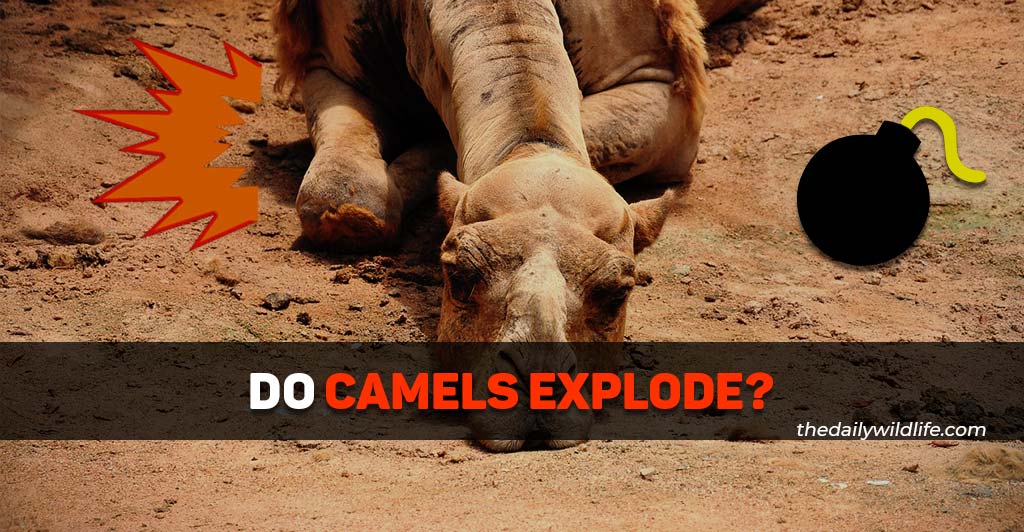Recently, I was watching an animal documentary on TV. In one part of the show, they were discussing natural animal explosions.
They mentioned how some stranded animals (whales) will sometimes create a big bang if left in the sun for a long time.
This made me realize people might wonder the same about camels: do camels explode when they die?
In this article, we explain that natural occurrence and why it happens.

Table of Contents
Do Camels Explode?
Camels can explode in the desert and their corpses are likely to burst. Usually, the dead body of the camel will swell in the sun, and if tampered with, it can create a big explosion that can be dangerous to humans or other animals.
Some insects, like ants, will explode to protect their colony from intruders. The process is called autothysis, where an animal destroys itself by detonating its organs and rupturing the skin. [1]
Other animals will explode because of people. In WW2, Allies filled rat carcasses with plastic explosives to sabotage the German forces. Soviets used dogs to carry explosives to German tanks and detonate them, and there were attempts to use the so-called “kamikaze dolphins” to destroy enemy submarines and warships.
Further reading: The role of camels in WW1
However, for camels, neither self-detonation nor human weaponization is the reason they explode.
Why Do Camels Explode When They Die Then?
Camels will explode because of the buildup of different gasses in their carcasses, in a process of natural decomposition. If someone touches that bloated, decomposing cadaver, it will create a big explosion and inflict serious wounds.
After the animal dies, it will pass through the same stages of the process of decomposition (being broken down into simpler forms of matter): [2]
- Fresh
- Bloat
- Active decay
- Advanced decay
- Dry
- Remains
What interests us here are the first two stages.
An adult, well-developed camel, might have a hump weighing as much as 80 pounds (35 kilograms)!
If a camel dies in the desert, there is no way for those fats from the hump to get processed by the body and get metabolized into water and energy. They will be slowly turned into organic acids, methane, and carbon dioxide.
In the camel’s stomach, the microorganisms like gut bacteria remain active. They will multiply, ferment and create more and more gasses in the camel’s corpse.
That gas will accumulate, the corpse will expand, and turn into a big bloated balloon.
Because it is left in the burning sun, the camel’s skin will become dry, rigid, and fragile. It will still trap a lot of gases inside the body, and as time passes by, this air pressure will increase, until it gets released through some weak point.
If a person touches it, the whole corpse might explode, releasing huge amounts of bacteria, viruses, and smelly gasses.
This is similar to what happens with stranded whales (exploding whales), or basically any other decomposing mammal.
Although this camel burst phenomenon is not common, it can cause injuries to nearby people and animals, as touching dead carcasses puts you at risk for many pathogens.
So a word of caution if you are in a desert: in case you encounter a camel cadaver, do not imitate Bear Grylls, and just step aside from this ticking biochemical bomb.
What Age Do Camels Die?
Camels usually die around 40 or 50 years of age, depending on the species. Domesticated will live for about 35 years. The average life expectancy for wild Bactrian camels is 30 years, but some Bactrian camels live up to 50+ years in the wild.
Despite being able to tolerate water losses of over 25% of their body weight, camels might still die from dehydration in the desert. [3]
If left to rot on the sun, sometimes, the blasting phenomenon explained here might occur.
It usually takes about 2 years for the camel carcass to completely decompose, 80% in the first year and 20% in the second.
In the first year after the death, a camel will emit 0.264 tonnes of CO2 and 0.066 tonnes in the second year.
TL;DR – Why Do Camels Explode?
A camel might blow up in a process of decomposition and accumulation of different gasses in its corpse. Methane, carbon dioxide, nitrogen, and other flammables might pile up, and if someone touches the corpse, it might explode. This is a natural phenomenon, also known as “exploding animal”.
We hope you found our article interesting and that we answered “do camels explode” properly.
References
[1] Shorter, J. R., and Olav Rueppell. “A review on self-destructive defense behaviors in social insects.” Insectes sociaux 59.1 (2012): 1-10.
[2] Zeng, Benxiang. “Camel culling and carbon emissions in rangelands in central Australia.” Journal of Environmental planning and management 58.2 (2015): 270-282.
[3] Wu, Huiguang, et al. “Camelid genomes reveal evolution and adaptation to desert environments.” Nature communications 5.1 (2014): 1-10.